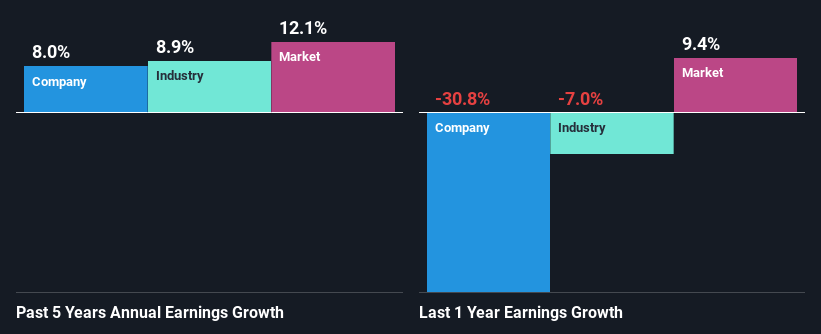- Japan
- /
- Entertainment
- /
- TSE:7974
Nintendo Co., Ltd.'s (TSE:7974) Stock's On An Uptrend: Are Strong Financials Guiding The Market?

Nintendo (TSE:7974) has had a great run on the share market with its stock up by a significant 16% over the last three months. Given that the market rewards strong financials in the long-term, we wonder if that is the case in this instance. In this article, we decided to focus on Nintendo's ROE.
Return on equity or ROE is a key measure used to assess how efficiently a company's management is utilizing the company's capital. Put another way, it reveals the company's success at turning shareholder investments into profits.
Check out our latest analysis for Nintendo
How Is ROE Calculated?
Return on equity can be calculated by using the formula:
Return on Equity = Net Profit (from continuing operations) ÷ Shareholders' Equity
So, based on the above formula, the ROE for Nintendo is:
13% = JP¥328b ÷ JP¥2.5t (Based on the trailing twelve months to September 2024).
The 'return' is the yearly profit. One way to conceptualize this is that for each ¥1 of shareholders' capital it has, the company made ¥0.13 in profit.
What Has ROE Got To Do With Earnings Growth?
Thus far, we have learned that ROE measures how efficiently a company is generating its profits. We now need to evaluate how much profit the company reinvests or "retains" for future growth which then gives us an idea about the growth potential of the company. Assuming everything else remains unchanged, the higher the ROE and profit retention, the higher the growth rate of a company compared to companies that don't necessarily bear these characteristics.
Nintendo's Earnings Growth And 13% ROE
At first glance, Nintendo seems to have a decent ROE. On comparing with the average industry ROE of 6.8% the company's ROE looks pretty remarkable. This certainly adds some context to Nintendo's decent 8.0% net income growth seen over the past five years.
As a next step, we compared Nintendo's net income growth with the industry and found that the company has a similar growth figure when compared with the industry average growth rate of 8.9% in the same period.

The basis for attaching value to a company is, to a great extent, tied to its earnings growth. It’s important for an investor to know whether the market has priced in the company's expected earnings growth (or decline). Doing so will help them establish if the stock's future looks promising or ominous. If you're wondering about Nintendo's's valuation, check out this gauge of its price-to-earnings ratio, as compared to its industry.
Is Nintendo Using Its Retained Earnings Effectively?
While Nintendo has a three-year median payout ratio of 50% (which means it retains 50% of profits), the company has still seen a fair bit of earnings growth in the past, meaning that its high payout ratio hasn't hampered its ability to grow.
Additionally, Nintendo has paid dividends over a period of at least ten years which means that the company is pretty serious about sharing its profits with shareholders.
Summary
In total, we are pretty happy with Nintendo's performance. In particular, its high ROE is quite noteworthy and also the probable explanation behind its considerable earnings growth. Yet, the company is retaining a small portion of its profits. Which means that the company has been able to grow its earnings in spite of it, so that's not too bad. With that said, the latest industry analyst forecasts reveal that the company's earnings are expected to accelerate. Are these analysts expectations based on the broad expectations for the industry, or on the company's fundamentals? Click here to be taken to our analyst's forecasts page for the company.
Valuation is complex, but we're here to simplify it.
Discover if Nintendo might be undervalued or overvalued with our detailed analysis, featuring fair value estimates, potential risks, dividends, insider trades, and its financial condition.
Access Free AnalysisHave feedback on this article? Concerned about the content? Get in touch with us directly. Alternatively, email editorial-team (at) simplywallst.com.
This article by Simply Wall St is general in nature. We provide commentary based on historical data and analyst forecasts only using an unbiased methodology and our articles are not intended to be financial advice. It does not constitute a recommendation to buy or sell any stock, and does not take account of your objectives, or your financial situation. We aim to bring you long-term focused analysis driven by fundamental data. Note that our analysis may not factor in the latest price-sensitive company announcements or qualitative material. Simply Wall St has no position in any stocks mentioned.
About TSE:7974
Nintendo
Develops, manufactures, and sells home entertainment products in Japan, the Americas, Europe, and internationally.
Flawless balance sheet with moderate growth potential.
Similar Companies
Market Insights
Community Narratives



